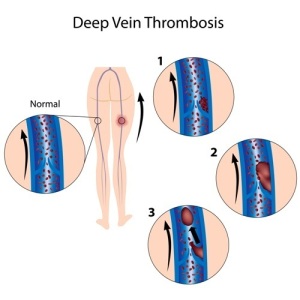Introduction
Cardiac output had been significantly elevated during pregnancy and it takes about 6 to 8 weeks for the cardiovascular system after delivery to normalize.
Blood coagulation is in an activated state, likely from vaginal tears, during and until about 1 week following the delivery. By 2 weeks after the delivery the coagulation status is normalized.
This poses a significant risk for women who had an operative procedure such as a cesarean section, forceps delivery, extensive repairs of lacerations or of a large episiotomy (=cut into the perineum to enlarge the outlet birth channel).
Pulmonary embolism
In these women there is a risk for developing blood clots in the legs or blood clots in the large pelvic veins. These can break off and migrate into the lungs (called “pulmonary emboli“). The physician can order Doppler ultrasound studies to look for clots and if present, can order heparin therapy to dissolve the clots.
References
1. The Merck Manual, 7th edition, by M. H. Beers et al., Whitehouse Station, N.J., 1999. Chapter 235.
2. B. Sears: “Zone perfect meals in minutes”. Regan Books, Harper Collins, 1997.
3. Ryan: Kistner’s Gynecology & Women’s Health, 7th ed.,1999 Mosby, Inc.
4. The Merck Manual, 7th edition, by M. H. Beers et al., Whitehouse Station, N.J., 1999. Chapter 245.
5. AB Diekman et al. Am J Reprod Immunol 2000 Mar; 43(3): 134-143.
6. V Damianova et al. Akush Ginekol (Sofia) 1999; 38(2): 31-33.
7. Townsend: Sabiston Textbook of Surgery,16th ed.,2001, W. B. Saunders Company
8. Cotran: Robbins Pathologic Basis of Disease, 6th ed., 1999 W. B. Saunders Company
More reference:
9. Rakel: Conn’s Current Therapy 2001, 53rd ed., W. B. Saunders Co.
10. Ruddy: Kelley’s Textbook of Rheumatology, 6th ed.,2001 W. B. Saunders Company
11. EC Janowsky et al. N Engl J Med Mar-2000; 342(11): 781-790.
12. Wilson: Williams Textbook of Endocrinology, 9th ed.,1998 W. B. Saunders Company
13. KS Pena et al. Am Fam Physician 2001; 63(9): 1763-1770.
14. LM Apantaku Am Fam Physician Aug 2000; 62(3): 596-602.
15. Noble: Textbook of Primary Care Medicine, 3rd ed., 2001 Mosby, Inc.
16. Goroll: Primary Care Medicine, 4th ed.,2000 Lippincott Williams & Wilkins
Further references:
17. St. Paul’s Hosp. Contin. Educ. Conf. Nov. 2001,Vancouver/BC
18. Gabbe: Obstetrics – Normal and Problem Pregnancies, 3rd ed., 1996 Churchill Livingstone, Inc.
19. The Merck Manual, 7th edition, by M. H. Beers et al., Whitehouse Station, N.J., 1999. Chapter 251.
20. The Merck Manual, 7th edition, by M. H. Beers et al., Whitehouse Station, N.J., 1999. Chapter 250.
21. Ignaz P Semmelweiss: “Die Aetiologie, der Begriff und die Prophylaxis des Kindbettfiebers” (“Etiology, the Understanding and Prophylaxis of Childbed Fever”). Vienna (Austria), 1861.
22. Rosen: Emergency Medicine: Concepts and Clinical Practice, 4th ed., 1998 Mosby-Year Book, Inc.
23. Mandell: Principles and Practice of Infectious Diseases, 5th ed., 2000 Churchill Livingstone, Inc.
24. Horner NK et al. J Am Diet Assoc Nov-2000; 100(11): 1368-1380.
25. Ferri: Ferri’s Clinical Advisor: Instant Diagnosis and Treatment, 2004 ed., Copyright © 2004 Mosby, Inc.
26. Rakel: Conn’s Current Therapy 2004, 56th ed., Copyright © 2004 Elsevier







